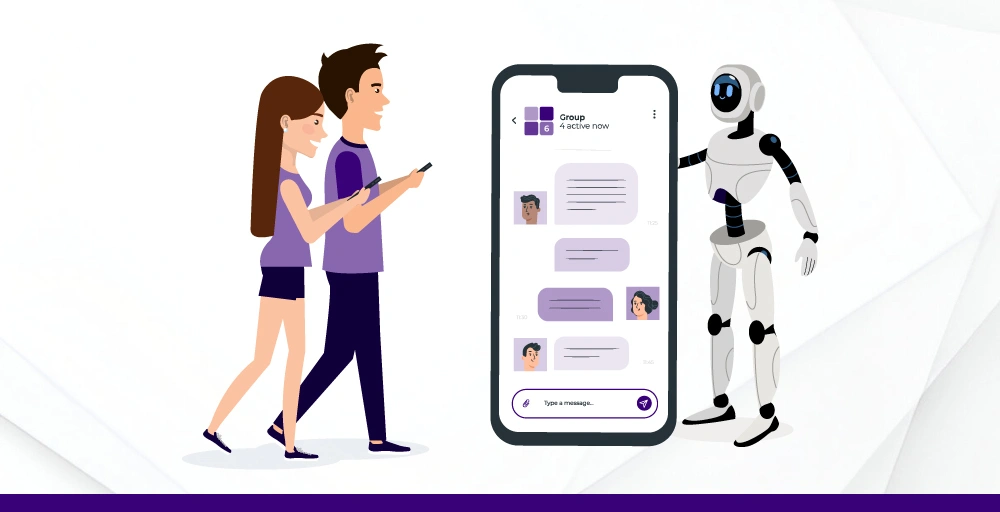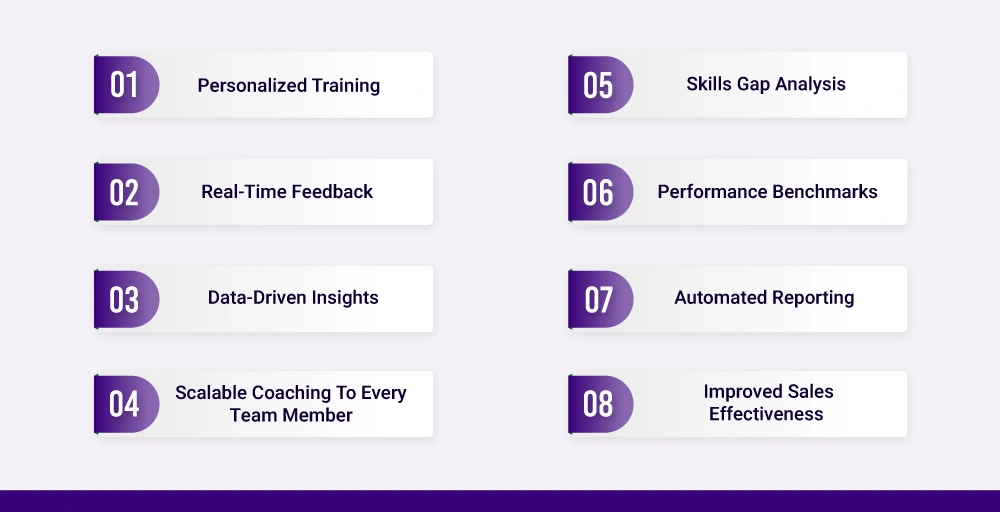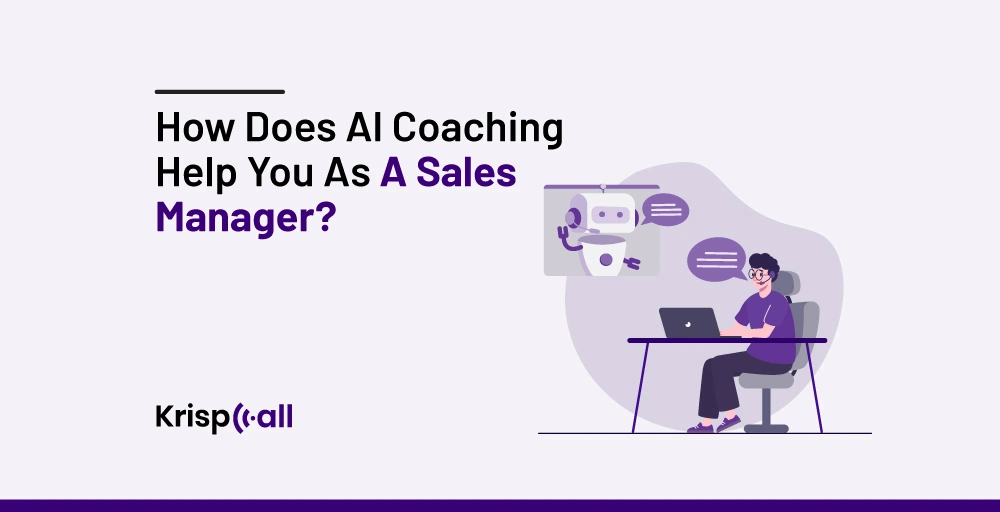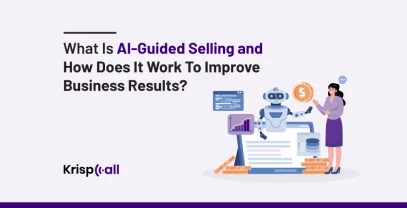Speaking about sales management, managers often face challenges in maintaining the team’s motivation and ensuring continuous achievement of their goals🎯. On one side, you face the challenge of meeting quotas; on the other, there’s the need to fine-tune your sales approach, develop your team’s skills, and stay aware of competitors’ activities.
This unrelenting process can often lead to stress, making it difficult to invest enough time in helping each team member and providing the necessary training 😞.
So, introducing AI coaching — a game-changing innovation that can change your sales management strategy.
AI coaching is a tool that provides personalized coaching, analytics, and real-time performance improvement. In this article, we’ll discuss these in depth.
Let’s get started! 🎉
🔐KEY HIGHLIGHTS
- AI coaching is a digital resource that uses artificial intelligence (AI) and NLP to help sales managers so that they can provide personalized coaching support.
- AI coaching facilitates sales managers to optimize their coaching strategies, improve team performance, and drive higher revenue.
- The role of AI in sales coaching helps to provide personalized training programs, real-time feedback and guidance, performance analysis and insights, predictive analytics for success, and continuous learning and development.
- AI coaching helps sales managers by giving data-driven insights, scalable coaching to every team member, automated reporting, improved sales effectiveness, and real-time feedback.
- By utilizing AI in sales coaching, you can take advantage of 24/7 availability, enhanced training materials, data-driven insights, cost-effectiveness, and scalability.
What is AI Coaching?
AI coaching is a method that uses artificial intelligence to provide personalized guidance and support to people looking to improve themselves or their careers. However, when applied to sales, it refers to the use of data science, artificial intelligence, and NLP techniques to provide personalized coaching support, actionable insights, and guidance to increase salespeople’s performance, tactics, and results.

You can use AI Coaching through various platforms, including mobile apps, web applications, and other AI virtual assistants. Moreover, AI coaching tools mostly include the use of chatbots or voice assistants to interact with users.
The Role of AI in Sales Coaching and Training
A number of industries have been transformed by the AI, including sales coaching and training. As for a fact almost 77 % of sales organizations use digital tools to increase performance, and 66% use AI for training and coaching.
So, a question arises: why is AI being so rapidly adopted across sales organizations? It’s because teams who invest in sales training and development technology significantly outperform their peers and often achieve a 57% higher success rate.
But what role does AI really play in coaching and training? To explain that, here are the key 5 roles that enhance sales coaching.
1. Personalized Training Programs
Since the AI algorithm can analyze your massive datasets of sales such as call recordings and performance metrics for each salesperson. Through this data, AI helps to identify skill gaps between salespersons and recommends specific modules, training materials, and personalized practices.
2. Real-time Feedback and Guidance
AI productivity tools mostly use Natural Language Processing (NLP) to analyze and understand sales calls in real-time, including the conversation’s flow, identify key phrases, and detect emotional tone. Nevertheless, it gives salesperson immediate feedback and suggestions on how to improve their sales pitch and address objections.
3. Performance Analysis and Insights
AI in sales goes beyond measuring basic sales metrics like revenue and conversion rates. It allows you to analyze data from different systems and identify patterns, trends, and correlations that impact sales performance. Additionally, through AI, you can get hidden insights that aren’t always obvious to human managers.
4. Predictive Analytics for Success
As AI can also evaluate historical sales data and performance metrics, it predicts whether salespersons are most likely to succeed in the future. As a result, it allows managers to focus on coaching efforts where they will have the greatest impact and make an effective sales strategy.
5. Continuous Learning and Development
AI-powered platforms can also be used to offer ongoing training and development opportunities. This helps to ensure that salespeople can stay up-to-date with the latest techniques and strategies.
For example, an AI platform can track salespeople’s progress in a training program, identify areas where they need additional practice, and recommend relevant micro-learning modules to strengthen their skills.
How does AI Coaching help Sales managers?
With so many challenges throughout the sales process, sales managers often experience burnout and struggle to maintain productivity. However, Sales managers can get numerous benefits by using a generative AI for customer service. Let’s explore how AI coaching can further support and enhance a sales manager’s performance.

1. Personalized Training
What is the strength of an AI-powered coaching platform? This platform allows you to analyze vast amounts of data on each sales representatives performance, including their interactions with customers, pipeline activity, and historical win/loss records.
By using an AI coaching tool, a sales manager can pinpoint the specific skills and knowledge areas where each rep needs the most improvement and provide training programs and development plans for individual sales teams. Moreover, this personalized coaching helps your reps progress more quickly, resulting in a boost in overall team performance.
2. Real-Time Feedback
During live sales calls and meetings, AI virtual sales assistants can monitor the conversation in real-time and provide instant feedback and guidance to the rep. For example, if a rep is struggling to overcome an objection, the AI can use conversation analytics to analyze the customer’s concerns, pull relevant information from the knowledge base, and suggest the most effective responses to move the deal forward.
This just-in-time coaching helps reps stay on track and make the most of every customer interaction. Sales managers can leverage these real-time insights to provide more timely and impactful coaching.
3. Data-Driven Insights
AI can track and analyze a wide range of sales metrics, including conversion rates, average deal size, sales cycle length, and win/loss ratios. By looking at these metrics at the individual, team, and organizational levels, AI can identify patterns and trends that reveal the specific areas where reps and managers need to focus their coaching efforts.
For example, if the data shows that reps consistently struggle to get customers to commit to the next step, the AI can recommend targeted training on effective call-to-action techniques. These data-driven insights allow sales managers to make more informed, strategic decisions about where to allocate their coaching resources.
4. Scalable Coaching To Every Team Member
In many sales organizations, managers simply don’t have enough time to provide high-quality, individualized coaching to every rep on their team. So, AI can help scale coaching by automating many of the repetitive, time-consuming tasks involved.
For example, an AI tool can analyze call recordings, provide feedback, and recommend the next steps for improvement so that it can also deliver personalized learning content and track each rep’s progress. By handling these routine coaching activities, AI frees up managers to focus on higher-level strategic coaching and mentoring.
As a result, this allows for more consistent, effective coaching across the entire sales organization, regardless of team size.
5. Skills Gap Analysis
AI-driven skills gap analysis enables sales managers to be more proactive and precise in their coaching efforts, leading to a more skilled and effective sales team. This approach not only boosts individual performance but also contributes to overall team success and organizational growth.
For instance, by examining data on successful and unsuccessful sales interactions, AI can help to identify areas where certain team members may lack expertise. This insight allows sales managers to effectively tailor their coaching or training sessions to address these gaps.
6. Performance Benchmarks
AI can establish benchmarks for different sales activities, from the frequency of customer interactions to the average deal closure time. This helps sales managers set clear performance expectations and coach those not meeting the benchmarks, ensuring consistent excellence across the team.
For example, if AI shows that top performers typically close deals within a certain timeframe, managers can use this benchmark to coach others who may be lagging behind. This ensures that all team members are striving for consistent excellence and can identify areas where improvement is needed.
7. Automated Reporting
AI can generate automated reports highlighting team and individual performance metrics, saving sales managers time and allowing them to focus more on coaching. These reports can provide valuable insights into areas such as pipeline health, conversion rates, and sales activity, enabling managers to quickly identify trends and make data-driven decisions.
8. Improved Sales Effectiveness
By automating routine tasks, personalizing training, and providing real-time coaching, AI helps sales managers become more productive and effective. Sales managers can spend less time on administrative work and more time engaging with customers. They also have access to the information that they can use to provide guidance to individual team members to have more impactful conversations.
The combination of increased efficiency and effectiveness leads to higher win rates, larger deal sizes, and faster sales cycles. Ultimately, AI-powered coaching helps sales teams achieve their full potential and drive better business results, which is a key priority for sales managers.
Advantages of using AI in sales coaching
There are many advantages of using AI in sales coaching. However, these are the most common advantages you can have while providing sales service.
- Data-Driven Insights: AI tracks and analyzes overall sales performance metrics; it provides sales managers with data-backed visibility into the exact areas where reps need improvement. As a result, salespersons can get more targeted coaching.
- Cost-Effectiveness: Unlike traditional coaching methods, like hiring external coaches or running extensive training programs, it can be expensive. So, with AI coaching platforms, you can find a scalable and cost-effective alternative. For instance, you can provide personalized coaching to your entire team without breaking the bank. Also, AI platforms typically have a subscription fee, eliminating the need for per-person coaching.
- Scalability: With AI, sales organizations can provide consistent, high-quality coaching across the entire sales team, regardless of size. This is one of the biggest advantages any organization can have.
- 24/7 Availability: Unlike human coaches, AI is always available. Through this availability, Sales reps can access coaching modules and practice scenarios and receive feedback anytime and anywhere. This also ensures that reps can continuously learn and improve at their own pace without being restricted by a coach’s schedule.
- Enhanced Training Materials: AI can curate and recommend the most relevant training materials based on a salesperson’s specific needs and learning preferences. This ensures that salespeople have access to the most effective resources. As a result. it helps to improve the efficiency and effectiveness of the coaching process.
Conclusion
When every salesperson is vying for the customer’s attention, it is not just smart to use AI coaching, but it is one of the genius ideas. So, when you introduce AI coaching to your sales management strategies, you should equip your team with the right tools, timely advice, and the right data to succeed.
Moreover, you are rid of the complications of their training and can now concentrate on performance and get record results. In addition, prepare for the new age of sales management with help from AI coaching and see your team increase their productivity and satisfaction. As a result, you can create the foundation for long-term success and outstanding performance.
FAQs
How to use AI as a sales manager?
As a sales manager, you can start by identifying your specific coaching needs and researching AI tools that align with your goals. Begin with a pilot program and gradually integrate AI into your coaching strategy.
How does AI help salespeople?
AI helps salespeople to provide personalized training, real-time feedback, and data-driven insights that help salespeople identify areas for improvement, develop their skills, and achieve better results.
What is the role of AI to optimize sales strategy?
The role of AI in optimizing sales strategy is to analyze data, gain insights to enhance sales strategy, and even predict future sales performance.
How can AI-powered tools help improve sales results?
AI-powered tools help to provide personalized training, real-time feedback, and data-driven insights that help salespeople identify areas for improvement, develop their skills, and achieve better results.





